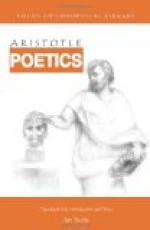III
There is still a third difference—the manner in which each of these objects may be imitated. For the medium being the same, and the objects the same, the poet may imitate by narration—in which case he can either take another personality as Homer does, or speak in his own person, unchanged—or he may present all his characters as living and moving before us.
These, then, as we said at the beginning, are the three differences which distinguish artistic imitation,—the medium, the objects, and the manner. So that from one point of view, Sophocles is an imitator of the same kind as Homer—for both imitate higher types of character; from another point of view, of the same kind as Aristophanes—for both imitate persons acting and doing. Hence, some say, the name of ‘drama’ is given to such poems, as representing action. For the same reason the Dorians claim the invention both of Tragedy and Comedy. The claim to Comedy is put forward by the Megarians,—not only by those of Greece proper, who allege that it originated under their democracy, but also by the Megarians of Sicily, for the poet Epicharmus, who is much earlier than Chionides and Magnes, belonged to that country. Tragedy too is claimed by certain Dorians of the Peloponnese. In each case they appeal to the evidence of language. The outlying villages, they say, are by them called {kappa omega mu alpha iota}, by the Athenians {delta eta mu iota}: and they assume that Comedians were so named not from {kappa omega mu ’alpha zeta epsilon iota nu}, ‘to revel,’ but because they wandered from village to village (kappa alpha tau alpha / kappa omega mu alpha sigma), being excluded contemptuously from the city. They add also that the Dorian word for ‘doing’ is {delta rho alpha nu}, and the Athenian, {pi rho alpha tau tau epsilon iota nu}.
This may suffice as to the number and nature of the various modes of imitation.
IV
Poetry in general seems to have sprung from two causes, each of them lying deep in our nature. First, the instinct of imitation is implanted in man from childhood, one difference between him and other animals being that he is the most imitative of living creatures, and through imitation learns his earliest lessons; and no less universal is the pleasure felt in things imitated. We have evidence of this in the facts of experience. Objects which in themselves we view with pain, we delight to contemplate when reproduced with minute fidelity: such as the forms of the most ignoble animals and of dead bodies. The cause of this again is, that to learn gives the liveliest pleasure, not only to philosophers but to men in general; whose capacity, however, of learning is more limited. Thus the reason why men enjoy seeing a likeness is, that in contemplating it they find themselves learning or inferring, and saying perhaps, ’Ah, that is he.’ For if you happen not to have seen the original, the pleasure will be due not to the imitation as such, but to the execution, the colouring, or some such other cause.




